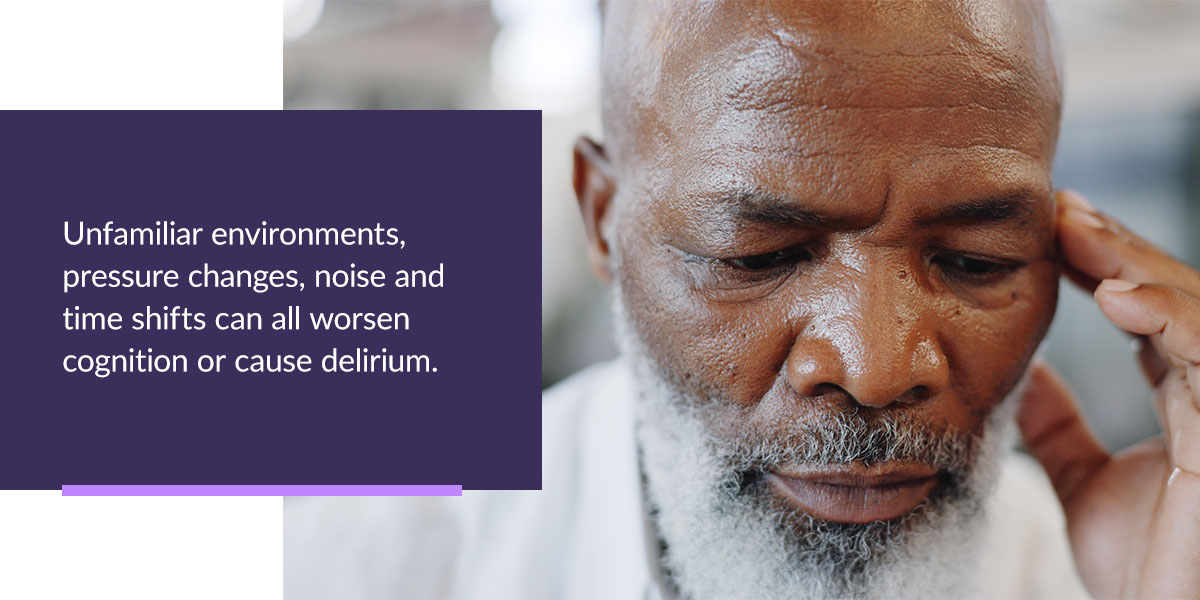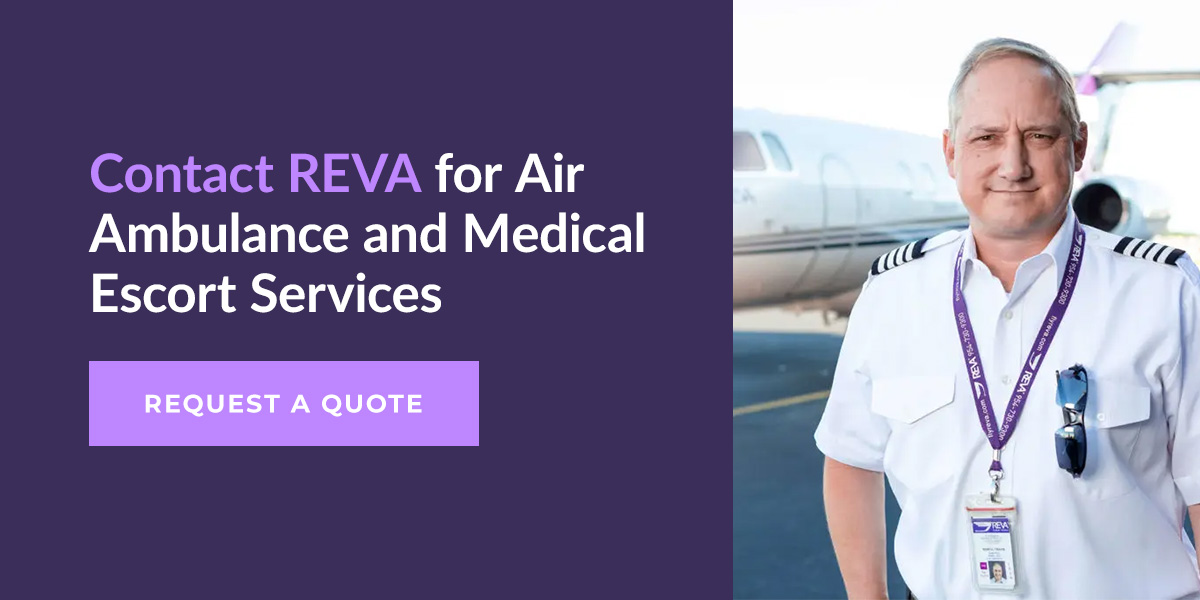Blog
STAYING ON THE FOREFRONT OF MEDICAL AIR TRANSPORTCan You Fly With Dementia?
According to the World Health Organization, over 55 million people are living with dementia worldwide, with approximately 10 million new cases emerging each year. Dementia can result in many physical and psychological symptoms that impair an individual’s ability to remember, make decisions and perform activities of daily living. If your parent, spouse or loved one has dementia, you may notice that they often become panicked or distressed in unfamiliar situations.
You may also have concerns about them wandering aimlessly and getting lost if they forget where they’re going. It’s not uncommon for people to experience stress or anxiety when traveling, especially in a bustling airport. Dealing with lines, crowds and noise can exacerbate dementia symptoms for some individuals. To overcome these challenges, we’re here to help you learn how to relocate loved ones with dementia safely and securely.
What Is Dementia?
Dementia is an umbrella term for cognitive and neurological changes that interfere with a person’s everyday life. It’s important to note that dementia and Alzheimer’s disease are not synonymous. Dementia is not a specific disease — it’s a generalized term used to describe an individual’s mental function or decline. Alzheimer’s disease is just one type of dementia. It’s also the leading cause of the condition, as most patients with dementia have Alzheimer’s, but not all.
There are many myths and stereotypes about dementia, including that it’s a normal part of aging or that patients affected by the condition cannot have a good quality of life. Not all individuals with dementia lose their memories or identity, but it is a possible side effect. Some symptoms of dementia can include problems with:
- Memory
- Problem-solving
- Reasoning and making decisions
- Judgment
- Communication
- Finances
- Balance and movement
- Understanding and expressing thoughts
- Paranoia or delusions
- Attention
- Coordination
- Mood
- Behavior
- Language
- Completing tasks independently
- Remembering the names of family members and friends
- Losing familiarity with people and objects
- Getting around independently
Challenges of Traveling With Dementia
While every individual is different, traveling with dementia can often be overwhelming or disorienting. In the early stages of dementia, your loved one may still enjoy traveling and advocate for doing things on their own. As their condition progresses or becomes more symptomatic, flying can become stressful and unsafe. Some travel considerations to keep in mind include:
1. Pre-Boarding Tasks
Navigating an airport, reading signs and looking at flashing screens of flight information can be confusing for someone with dementia. Your loved one may wander around looking for a bathroom, miss their boarding time or feel disoriented in an unfamiliar environment.
Getting through the security line can also be anxiety-inducing, particularly if they become overwhelmed and end up losing their belongings, medication or identification. They must follow complex directions and interact with strangers in an often crowded space, which can be unsafe for them. Likewise, running late for boarding or trying to make a tight connecting flight may result in them getting lost or experiencing strong emotions.
2. Environmental Changes
Once they’re in the air, your loved one may not react well to pressure changes, humidity, time changes and noise from the aircraft. Some people with dementia also experience incontinence and sleep problems, which can make long flights very uncomfortable.
3. Behavioral and Psychological Challenges
Some patients with dementia may experience unpredictable behavior and struggle to follow instructions. This can lead to security breach issues on a commercial flight. Your loved one may be removed from the flight if they resist the flight crew’s directions or become uncooperative. Additionally, reacting with aggression or being unable to communicate with employees can cause difficulties.
4. Stigma and Hidden Signs
Unlike a physical impairment, people with dementia may not always be perceived as needing assistance while traveling. When they’re confused, frightened or anxious, they may react verbally or exhibit violent behavior. This can lead to harmful and misleading assumptions by security staff and flight crew, such as thinking your loved one is being rude or difficult.
Does Flying Make Dementia Symptoms Worse?
Traveling in any sense can heighten symptoms of dementia because new activities and changes in environments often trigger negative responses. Though not every individual with dementia will experience high stress, anxiety or responsive behaviors, traveling alone with dementia is usually not recommended during any stage.
Whether your loved one is in the early or advanced stage of dementia, they may often become confused about their location or fear being alone. Unfamiliar environments, pressure changes, noise and time shifts can all worsen cognition or cause delirium. If your loved one has advanced dementia, such as frequent behavioral issues or delusions, flying commercial may not be possible. Even short, domestic flights can be challenging for you and your parent, spouse or relative.
How to Safely Transport Loved Ones With Dementia
Older adults with dementia may become frustrated, overstimulated or upset during a flight and have trouble expressing their needs. However, this doesn’t mean they cannot travel safely and comfortably. Here are two ways your loved one can have a seamless transportation experience:
Air Ambulances
Traveling domestically or internationally can be unsafe for many patients with advanced conditions like dementia. If your loved one requires critical, around-the-clock care and supervision, an air ambulance will safely transport them to their destination.
As self-contained critical care units, air ambulances are ideal for patients with dementia who need emergency care or quick transportation to a hospital, specialist or facility. Air ambulances can also be used for medical evacuation or to transfer your loved one back home after an injury or illness.
Medical Escort Services
Having your loved one travel alone can be worrisome, especially if they require medication or have conditions like incontinence where they may need assistance. Even when you’re traveling with your parent with dementia, you may not be capable of providing the attentive medical care they need. A medical escort, often called a flight nurse, can accompany your loved one with dementia on their flight, no matter the distance.
Medical escort services are ideal for patients who need medical supervision but do not have any life-threatening conditions. Flight nurses can also offer mental health support to people with dementia who cannot travel unassisted, helping them remain calm throughout their journey. A medical escort will help your loved one board and exit the plane, use the restroom, communicate with you and ensure they have all necessary medications and equipment on hand.
Why Trust Us for Medical Flight Transportation
At Reva, Inc., we’re dedicated to providing safe, comfortable air ambulance transportation for all patients. We understand that traveling by commercial plane can be stressful, overwhelming or even unsafe for people with dementia. We want to help you and your loved one get to your destination efficiently while eliminating common travel stressors. Our experienced and highly trained specialists offer personal, compassionate medical treatment. We provide convenient, appropriate care in all aspects of transport worldwide.
Our air ambulance and medical escort services protect the safety and medical well-being of your loved one and ensure a smooth transportation journey. Whether your loved one is relocating to a long-term specialized care facility or traveling long-distance, we’ll coordinate all aspects of care. Our team will handle clinical and travel documentation, medical and flight crews and ground transportation — domestic or abroad. We’re also proud to offer medical transportation 24/7, 365 days a year.
Contact REVA for Air Ambulance and Medical Escort Services
Flying with dementia is possible with the right support. If your loved one has symptoms of advanced dementia, such as behavioral or communicative difficulties, then an air ambulance or medical escort may be the solution. At REVA, we want to help our patients travel safely and comfortably. That’s why we offer the highest quality of care with our air ambulance and medical escort services.
Whether your loved one struggles with memory loss or requires much-needed medical support on their trip, you can rely on our highly trained and experienced professionals. It’s our goal to create a seamless trip for you and your loved one by coordinating essential documents, transportation, insurance coverage and risk assessment analysis. Contact us today to request a free quote for our medical air transport services.



